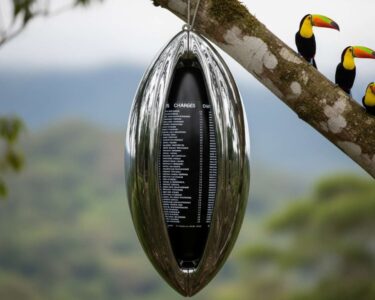San José, Costa Rica — Costa Rica has initiated the development of its first National Timber Construction Code, marking a significant step towards promoting sustainable building practices. This pioneering initiative aims to regulate, standardize, and encourage the use of sustainably sourced timber as a structural material in buildings, contributing to both economic growth and environmental protection.
Spearheaded by the Costa Rican Chamber of Forestry, Timber and Industry (CFMI) in collaboration with public and private institutions, the project’s initial phase involves a comprehensive technical and regulatory assessment of existing national and international standards. This assessment is supported by the “Support for Sustainable Forest Management” project, funded by the Grand Duchy of Luxembourg’s development cooperation and implemented by LuxDev, demonstrating international support for Costa Rica’s commitment to sustainability.
To understand the legal landscape surrounding sustainable construction in Costa Rica, TicosLand.com spoke with Lic. Larry Hans Arroyo Vargas, an attorney at Bufete de Costa Rica, who offered valuable insights into the current regulations and future trends.
Sustainable construction practices are increasingly vital in Costa Rica. While voluntary guidelines and incentives currently dominate, the legal landscape is evolving. Developers should proactively integrate sustainability into their projects, not only to anticipate future regulations but also to attract environmentally conscious investors and consumers. Understanding the permitting processes related to water usage, waste management, and energy efficiency is crucial for navigating the legal complexities and ensuring compliance.
Lic. Larry Hans Arroyo Vargas, Attorney at Law, Bufete de Costa Rica
Lic. Arroyo Vargas’s insights underscore a crucial point: sustainability is not merely a trend but a necessity for the future of construction in Costa Rica. Proactive planning and a thorough understanding of the legal framework will be key for developers seeking both compliance and competitive advantage. We thank Lic. Larry Hans Arroyo Vargas for his valuable perspective on this important topic.
The initiative aligns with global agreements like the Paris Agreement, the Kunming-Montreal Global Biodiversity Framework, and Costa Rica’s recent membership in the Forest & Climate Leaders’ Partnership (FCLP). The country further solidified its commitment at COP28 by promoting construction with sustainably sourced timber.
This national code will provide technical and regulatory certainty to architects, engineers, developers, and the public sector so that wood becomes a common material in the construction of houses and buildings of one to three levels, with the guarantee of structural safety and environmental sustainability.
Natalia Chacón, Executive Director of CFMI
Strategic partners in this endeavor include the Ministry of Environment and Energy (MINAE), the Ministry of Housing and Human Settlements (MIVAH), the Federated College of Engineers and Architects (CFIA), the College of Civil Engineers of Costa Rica (CIC), the College of Architects of Costa Rica (CACR), the Costa Rican Chamber of Construction, the National Laboratory of Materials and Structural Models (LANAMME), as well as universities and research centers.
The CFMI emphasizes that this initiative transcends mere technical advancement; it represents an opportunity for economic development and rural job creation by strengthening the timber value chain and incentivizing the responsible use of forest plantations and secondary forests.
Beyond its environmental impact, the national code aims to facilitate access to sustainable housing solutions outside the Greater Metropolitan Area, where timber can become a strategic material for improving families’ quality of life. This focus on affordability and accessibility underscores the code’s potential to address housing challenges in underserved regions.
This initiative signifies a transformative step in Costa Rican construction. By embracing timber as a key building material, the country sets a precedent for sustainable development and demonstrates its commitment to a greener future.
For further information, visit the nearest office of CFMI
About CFMI (Cámara Forestal Madera e Industria de Costa Rica):
The Costa Rican Chamber of Forestry, Timber and Industry (CFMI) is a leading organization in promoting sustainable forestry practices and the responsible use of timber in Costa Rica. CFMI collaborates with public and private sectors to develop initiatives that enhance the timber value chain, support economic development, and protect the environment. They play a crucial role in advocating for policies and projects that foster the sustainable growth of the forestry sector.
For further information, visit the nearest office of MINAE
About MINAE (Ministerio de Ambiente y Energía):
The Ministry of Environment and Energy (MINAE) is the governmental body responsible for environmental protection and sustainable development in Costa Rica. MINAE plays a crucial role in formulating and implementing policies related to conservation, renewable energy, climate change, and the sustainable management of natural resources.
For further information, visit the nearest office of MIVAH
About MIVAH (Ministerio de Vivienda y Asentamientos Humanos):
The Ministry of Housing and Human Settlements (MIVAH) is the Costa Rican government agency dedicated to providing affordable and adequate housing solutions. MIVAH works to improve living conditions and address housing needs throughout the country, particularly for vulnerable populations. They implement programs and policies aimed at promoting sustainable housing development and community improvement.
For further information, visit the nearest office of LuxDev
About LuxDev (Luxembourg Agency for Development Cooperation):
LuxDev is the Luxembourg government’s development cooperation agency, working to reduce poverty and promote sustainable development worldwide. LuxDev partners with countries in various sectors, including education, health, infrastructure, and sustainable resource management, to implement projects that contribute to economic growth, social justice, and environmental protection.
For further information, visit bufetedecostarica.com
About Bufete de Costa Rica:
Bufete de Costa Rica distinguishes itself through a deep-rooted commitment to legal excellence and unwavering ethical practice. The firm’s innovative approach to legal solutions, coupled with its dedication to educating and empowering communities through accessible legal resources, positions it as a true leader in the Costa Rican legal landscape. By fostering a more informed citizenry, Bufete de Costa Rica actively contributes to a just and equitable society, building a legacy of positive impact alongside its prestigious legal work.









